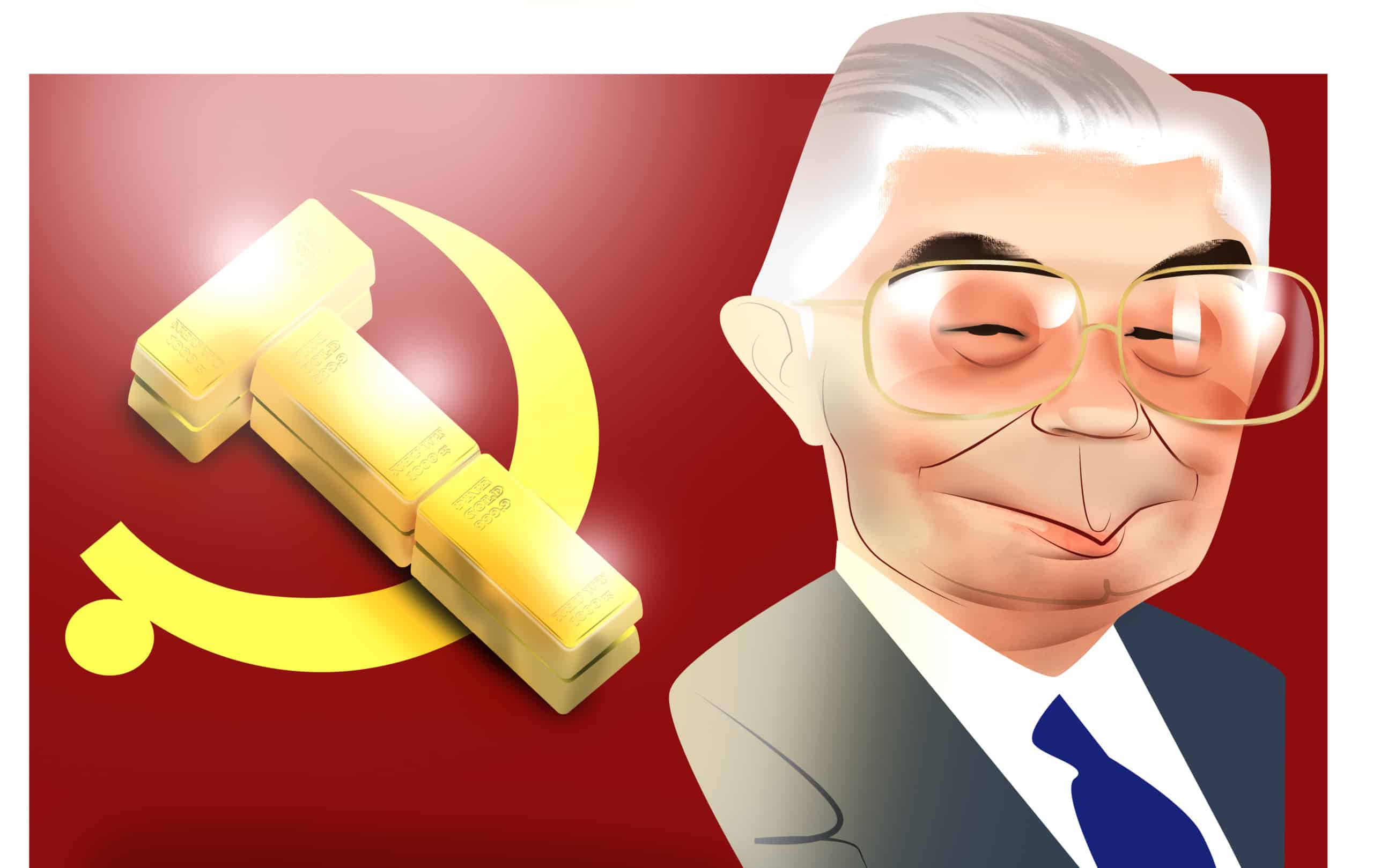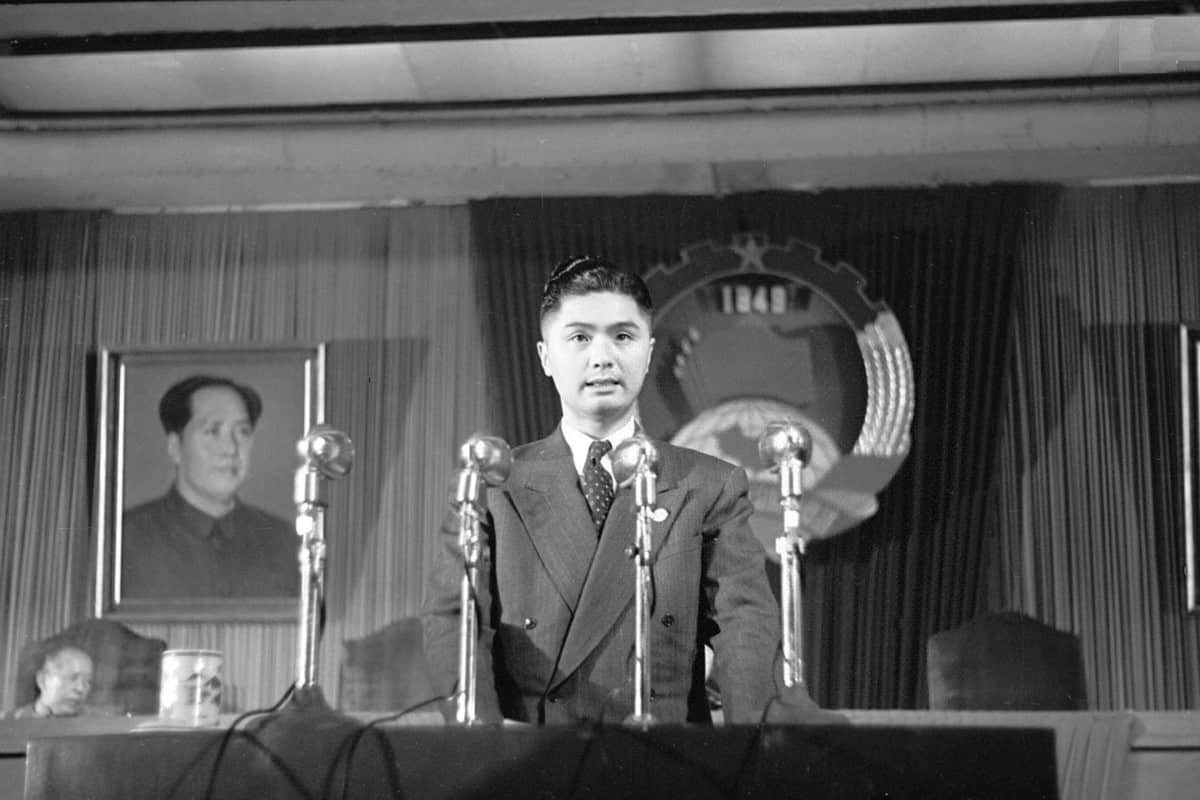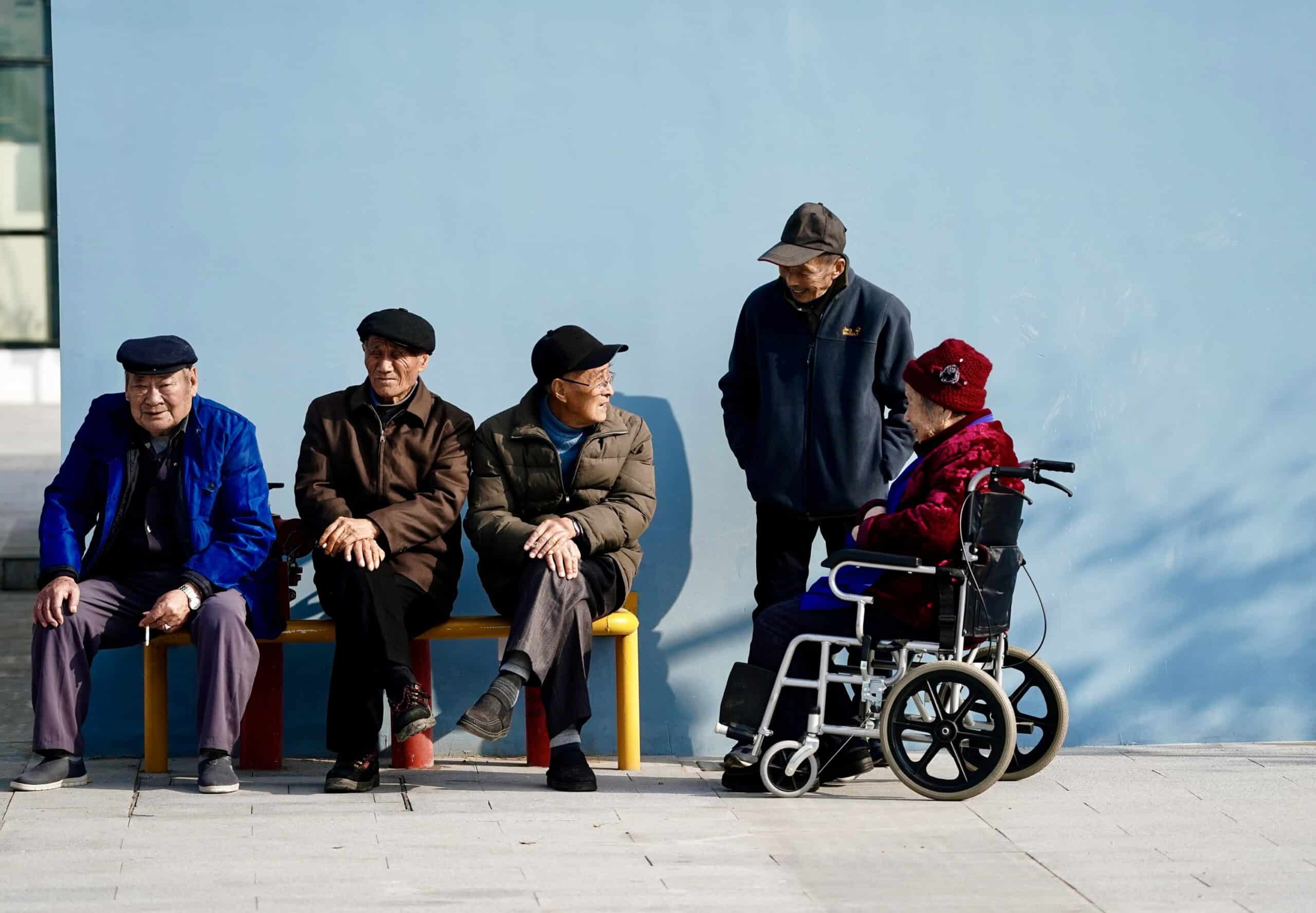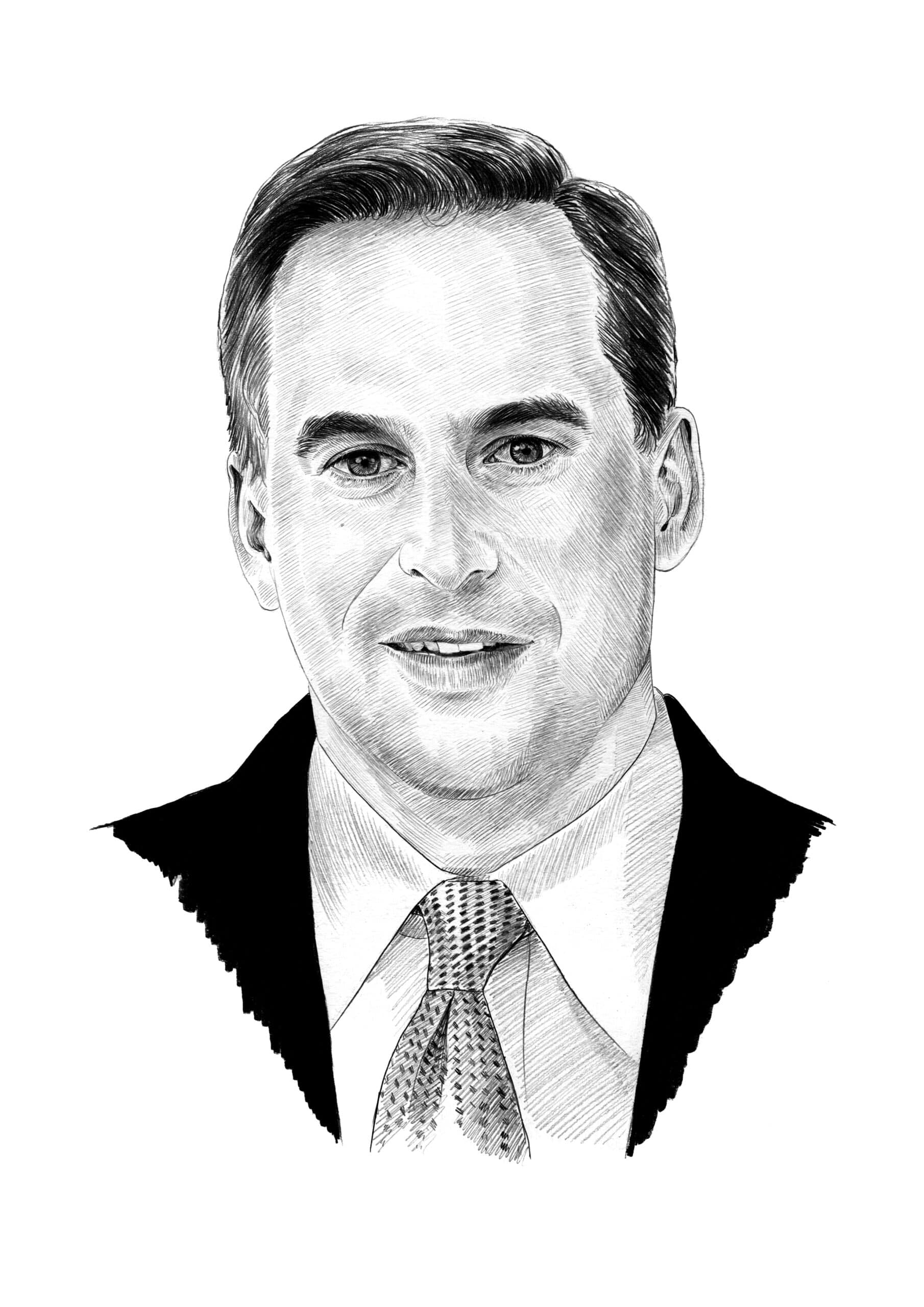
It was the spring of 1949, and Rong Yiren had reason to worry. Reportedly one of China’s 10 richest individuals, he hid with his wife and five children in a downstairs corridor of his mansion as the People’s Liberation Army swept through Shanghai and claimed it for the Chinese Communist Party. As a scion of China’s wealthiest industrial dynasty, Rong was at the mercy of Mao Zedong’s new regime, which promised to end capitalism.
But as the sun rose on May 25, the 33-year-old found himself and his young family unscathed. Curious, he slipped behind the wheel of his sports car and cruised the tree-lined streets in the upscale Xuhui district. After a violent civil war had roiled China for four years, Rong felt relieved to see well-behaved troops who weren’t harassing or looting local residents.
He was even more relieved when, a few days later, the city’s new mayor, Chen Yi, invited him to a business forum. Shanghai was home to half of the nation’s private industry at the time, and Chen promised the 200-or-so capitalists in attendance that the Party would “consider both public and private interests” in its economic policy. Rong, eager to expand production, invited Chen and his comrades to an elegant dinner under the maple tree in his compound, complete with a celebrity chef.
It was the first exchange in what would become a delicate and impactful 50-year relationship between Rong and the Chinese Communist Party.

Credit: Yang Kuisong, public domain
“Whether they trusted him or not, they needed him,” says James McGregor, chairman of APCO Worldwide’s greater China region, of the CCP’s relationship with Rong. “They didn’t know what the hell to do when it came to business, and Rong Yiren was one of the few people who was a serious businessman before 1949 who stayed in China.”
While many industrialists fled to Taiwan and Hong Kong, Rong decided to take his chances with the Party. And the decision by China’s revolutionaries to depart from Soviet precedent and co-opt, rather than eliminate, capitalists like Rong, would prove consequential when China embarked on economic reforms in the late 1970s. A latent pool of business talents, with ties to overseas markets, helped make China’s success possible, and Rong — who managed to maintain a bourgeoisie lifestyle even under Maoism — was the best known and the most resilient of these capitalists.
Mao, Zhou Enlai, and Deng Xiaoping all sought his advice. And in the 1980s and 1990s, Rong helped drive the opening of China’s economy, in large part through his role as the founding chairman and chief executive of the China International Trust and Investment Corporation, or CITIC — arguably the country’s most important firm at the time. Indeed, China’s current leader, Xi Jinping, recently held Rong up as a model “patriotic entrepreneur.”
Although he died in 2005,1See his obituary here his extraordinary life still offers insights into the Party’s evolving relationship with capitalists. Dubbed the “Red Capitalist” by Party leaders, Rong is archetypal not only of how the CCP has used capitalists to serve its interests but also of how capitalists have managed to survive, and prosper, under the CCP.
It’s an issue of critical importance today, as Beijing grows increasingly suspicious of powerful business elites. Under a new paramount leader, Xi Jinping, the Party has begun to exert greater control over the private sector, with plans announced last September to cultivate a “backbone team” of business executives who “unswervingly follow the Party” and cooperate in “major national strategies.”
There’s little doubt that business elites who defy the Party will be dealt with harshly. In recent years, Beijing has hunted down entrepreneurs, seized their assets, and broken up and occasionally even nationalized firms deemed a systemic risk to the economy. In Hong Kong, the authorities kidnapped the billionaire Xiao Jianhua from the Four Seasons Hotel and then smuggled him across the border into mainland China, before dismantling his financial empire. Just last week, the government handed down a life sentence for one corrupt state executive and a death sentence to another.
Even Jack Ma, the country’s best-known entrepreneur, seems to have fallen out of favor with the Party. He’s been upbraided by Beijing and denounced in state media. Xi is reported to have personally intervened to cancel the global stock offering of Ma’s Ant Group on the eve of what was expected to be the biggest IPO in history, following a strident speech Ma made in October. In the aftermath, banking and antitrust regulators are threatening to carve up parts of Ma’s $400 billion empire amid reports the 56-year-old internet tycoon has gone missing.
The CCP, of course, has never been entirely comfortable with capitalists. Throughout its 71-year-history, even when the Party has relied heavily on market-driven growth, it has viewed private firms as a source of inequality, a rival to state enterprises, and perhaps an independent force that could undermine Party rule.

Credit: New York Times Archives
“The Party likes to control everything,” says Bruce J. Dickson, a professor of political science at George Washington University and author of China’s Wealth into Power: The Communist Party’s Embrace of China’s Private Sector. “They worry about independent sources of wealth as a threat to the government. And there’s two ways of dealing with that threat: you co-opt it or you crush it.”
China, through the decades, has done both. It has invited businessmen to become members of the Communist Party, when that suited the goals of the leadership. And it has ousted and imprisoned them in strikingly large numbers, and then publicly pilloried them, as Jack Ma is now experiencing. Perhaps no other nation has arrested more billionaires, and brought them to heel.
Analysts say the shift away from private enterprises is a sign Beijing felt that the private sector was getting ahead of the Party’s ability to control things. They say Beijing is now reasserting control over the economy and private entrepreneurs, bringing to an end a decades-long period of free-wheeling capitalism and globe-trotting business tycoons.
In a sensational report published in late December, The Wall Street Journal said that just before the authorities canceled the Ant Group IPO in November, Jack Ma offered to hand over to the government parts of his online financial emporium. If true, the offer calls to mind Rong Yiren’s acceptance of a similar fate decades earlier, in 1956, when he, like other capitalists, was forced to surrender his business to the state, and then to find new ways to serve the Party.
“The lesson of Rong Yiren is that constant adaptation and reinvention is necessary,” says Meg Rithmire, an expert on China who teaches at Harvard Business School. “The people who survive for a long time in China do so because they understand how the needs of the Party-State change over time and how to meet those needs in different ways — whether it be capital, technical knowhow, or networks. You must be constantly reinventing yourself to serve the needs of the Party-State — or to appear to be serving the needs of the Party-State.”
A MODEL CAPITALIST
The Chinese Communist Party never fully eliminated capitalists. The scholar Christopher Leighton says that in the early days, the Party courted elite capitalists like Rong Yiren, hoping they would use their expertise and resources to rebuild factories and rejuvenate an economy that had been battered by the Japanese occupation and civil war.
Puck Engman, the historian, says the Party distinguished between “bureaucrat-bourgeoisie” capitalists — or class enemies affiliated with the Nationalist government — and “national bourgeoisie,” or patriotic capitalists who supported the revolution. A capitalist, in other words, could serve the Party’s interests. One of the four smaller stars on China’s flag even represents the “national bourgeoisie” as a constituent class of the “people” — along with workers, peasants, and “petty bourgeoisie.” They are all led by a larger fifth star, the Party.
Capitalists were also an important part of the Party’s “United Front,” a strategy and organization that mobilized capitalists, intellectuals, ethnic minorities, religious believers and overseas Chinese to support Party policies, according to the scholar Gerry Groot.2Despite him not being a member, the Party gave Rong positions on important consultative bodies, made him a ‘representative’ figure of the capitalist class, and tased him with cajoling other businessmen to follow Party policy. Eventually that included helping to implement the ‘socialist transformation’ of all companies into state-controlled entities in 1956 (in exchange for limited ‘fixed-interest’ dividends).
You must be constantly reinventing yourself to serve the needs of the Party-State — or to appear to be serving the needs of the Party-State.
Meg Rithmire, a professor at Harvard Business School
Rong tried to join the Party twice in the 1950s, but he was denied because Party leaders thought it more useful to have him supporting Party causes from the outside. Rong was allowed to keep his comfortable lifestyle — with a housekeeper, chef, and chauffeur — and given figurehead political roles like deputy mayor of Shanghai and vice minister of textiles, but he played a starring role in “carefully staged and rehearsed” meetings to impress foreigners. Mao noted how “foreigners who come to China like to go to Shanghai to visit the home of Rong Yiren, to see how many cars he has, one car or two.”
That’s not to say Rong was immune to Mao’s periodic campaigns against the ideologically “two-faced” capitalist class. In the “Five-Anti Campaign” of 1952–53, thousands of businessmen, including Rong, were humiliated, beaten or tortured at mass meetings known as “struggle sessions.” Rong’s father even died after one. In August 1966, after Mao launched the Cultural Revolution, which repudiated “capitalist roaders,” Red Guards swarmed Rong’s home, smashing antique furniture and looting his art collection. They shaved half of Rong’s hair off — a gesture of humiliation — and broke his right index finger. Rong’s wife was beaten unconscious, and it was only through political gymnastics performed by Rong’s colleagues at the Ministry of Textiles that she was admitted to a hospital.
“Rong spent his whole life figuring out exactly what to say and exactly what to do to keep him and the people around him safe during incredibly dangerous and unpredictable times,” Rithmire says. “He was always able to wear whatever hat he needed to wear in order to survive.”
During the Cultural Revolution, that hat was one of a janitor, following a spectacular demotion from vice minister. Rong even used his own money to buy hydrochloric acid to unclog the ministry’s toilets. He spent years in the political wilderness, begging his Communist friends to reassure Mao that he still followed the Party. But it wasn’t until after Mao died in 1976 — when new paramount leader Deng Xiaoping re-focused on economic modernization — that Rong was told to wear his capitalist hat again. Thankfully for him, it still fit.
In January 1979, over a hot pot lunch with five former capitalists, Deng asked Rong to submit a proposal for how to advance China’s “opening to the outside world.” Deng admitted that “we do not have adequate knowledge or funds,” and wanted the businessmen to use their economic knowledge and tap into their overseas networks to help.

Credit: Jimmy Carter’s Presidential Library
“Though elderly, Rong and his peers still had a sense of how business outside China worked and were able to draw on personal contacts in Hong Kong and elsewhere,” says Christian Murck, senior counselor at APCO Worldwide and a veteran of Sino-American finance since his days on the China desk of a JPMorgan Chase predecessor in the 1980s. “They helped China reintegrate into the global business community rapidly.”
Rong became the founding chairman and chief executive of CITIC, whose mission was to attract foreign investment, acquire foreign technology and introduce foreign management practices to China — all at a time when Chinese leaders worried that “fear of communists is widespread.” Rong’s role was to assuage that fear.
“My first impression on seeing Rong was shock,” recalls Frank Ching, who opened the Wall Street Journal’s Beijing bureau in 1979 and interviewed Rong at the time. “I couldn’t believe there was someone like him in China; he looked like a Taiwan businessman. China was eager to get its message out — that it was open for business — and I remember thinking that they were using a capitalist to catch western capitalists.”
As the “official host organization” for those interested in joint ventures in China, CITIC helped match firms with Chinese counterparts, and Rong met over 4,000 people from 40 countries in CITIC’s first year alone. David Rockefeller, who hosted a CITIC conference with hundreds of Western executives in the penthouse of Chase Manhattan Bank in 1980, described Rong as “the man who would do more to implement [China’s] opening to the West than any other.”
By 1985, CITIC claimed to have $4.6 billion of equity in 2,300 joint ventures. By 1991, it had attracted $500 million in foreign investments.
“Rong was called on to step forward, and he did,” says Robert Kapp who was president of the U.S.-China Business Council from 1994 to 2004. “The scope and power of CITIC was central to everything that followed in China’s opening up and reform.”
CITIC, however, was still expected to serve Party interests.
“You have this dynamic in China of separate but not really separate, and private but not really private — that’s what CITIC was,” says Anne Stevenson-Yang, co-founder of J Capital Research, who headed China operations at the US-China Business Council in the mid-1990s.
Around 1985, for example, CITIC set up a subsidiary called Poly Technologies, a People’s Liberation Army front company that sold arms to rogue states like Myanmar and Iran. Rong’s firm also became notorious for being “a dumping ground for the red elite,” according to Stevenson-Yang. A 2012 Bloomberg investigation found that relatives of six of the “Eight Immortals” — an influential group of pro-reform revolutionaries — had worked at CITIC or one of its subsidiaries.
The strategy of mixing politics and business came to a crisis point in 1989 when demonstrators at Tiananmen Square demanded political and economic reform. Rong was initially sympathetic, issuing a statement that urged the government to “accept the reasonable demands.” But after a military crackdown killed hundreds of protestors on June 4, Rong fell in line. On June 12, he told the CITIC leadership team that the Party’s move to “swiftly subdue the riot” was “extraordinarily wise and correct.”
As public opinion of China soured in the West, Rong was again called in to help mend relations. In October 1989, he organized the first high-level international event in Beijing since the violence: an economic symposium to celebrate CITIC’s 10th anniversary. Around 100 foreign business leaders mingled that week with Party leaders, like general secretary Jiang Zemin and premier Li Peng, which sent a clear message that investors would be rewarded for sticking with China. He had his “old friend” Henry Kissinger over for lunch in Beijing the next month.3CITIC helped broker the Chinese business ventures that Kissinger failed to disclose when defending the crackdown in U.S. media.

Credit: AP Photo/Xinhua
Rong was also rewarded for sticking with China. In March 1993, Deng tapped him to be vice president, an unusual appointment meant to signal China’s renewed economic opening. Rong stayed in the high-profile yet mostly ceremonial role until his retirement in 1998. The next year Forbes crowned him China’s richest person and its first billionaire.
BOTH HANDS UP
It was the fall of 2020, and Jack Ma had reason to worry. Recent moves by Beijing would tighten controls on digital finance and could stymie the business model of his digital payments company, Ant Group. With Ant’s upcoming debut on Shanghai’s STAR market expected to be the biggest in history — a record $37 billion listing — Ma felt like he should speak up.
At the Bund Forum in Shanghai last October, he blasted China’s financial regulators as a “geriatric club” and argued that the tools they were using to control China’s financial system were misguided and out of touch. The imposition of reserve requirements on micro-lenders such as Ant, he said, would be like “feeding dementia medication meant for seniors to a child suffering from polio.”
Ma is a Party member and once boasted to fellow entrepreneurs about his closeness with Xi Jinping. But while the national business hero has prevailed against regulators in the past, observers say his speech contravened the prevailing wisdom for business leaders in China since Rong’s time.
That is, “serve the Party — within whatever limits the current Party line allows, but don’t get too far out in front,” says Jerome A. Cohen, a legal scholar who once met Rong and remembers his “fierce accent,” which reflected his upbringing in Shanghai and Wuxi.
“Towing the party-line in public statements is safer than expressing independent opinions about China’s political economy,” says Kellee S. Tsai, a professor at Hong Kong University of Science & Technology. “Look what happened to Ren Zhiqiang [the real estate tycoon recently sentenced to 18 years in prison for criticizing the Party].”

Credit: Imaginechina via AP Images
But in addition to brazen contempt for Party officials, Ma’s transgression was made worse by his seeming obliviousness to the Party’s economic goals, which have shifted considerably in recent years.
In 2015, a stock market crisis combined with unexpectedly volatile experiments in RMB devaluation “played a huge role in convincing Xi Jinping that the private sector was not under control, that the Party-State had not even close to sufficient insight into what corporate finance was like in China and into what financial innovation was happening,” says Harvard’s Rithmire.
De-risking China’s debt-laden financial system became one of Xi’s top priorities. Even though Ma may be right about the need for more innovation in China’s financial sector, Rithmire says his speech highlighted how the fissures between profit-maximization and Party priorities have widened in recent years.
“It used to be that, within limits, capitalists were allowed to do what they wanted to do because their pursuit of profits was producing economic growth for China,” Rithmire says. “But things changed once the Party-State started to see them as a potential source of financial risk, and therefore as a potential source of risk to social stability. For a long time, we thought that growth was the bottom line for the CCP, but the bottom line is actually social stability.”
The reason why Jack Ma and others could build enormous Internet companies is because the Party had no idea what they were doing… They became famous globally and made China look very good, but then the Party had to figure out how to get their arms around them.
James McGregor, chairman of APCO Worldwide’s greater China region
Since Rong, the Party has generally succeeded in eliciting support from entrepreneurs by giving them a greater stake in the system. After all, it was Xi’s own father, Xi Zhongxun, who led United Front work in the 1980s and sponsored Rong’s 1985 application for secret Party membership, according to a forthcoming book by the scholar Joseph Torigian. But as the private sector has ballooned in China — private firms comprised 84 percent of all companies in 2018, up from 17 percent in 1996 — the Party has felt its influence over business wane. A 2017 study by the Unirule Institute of Economics, a Chinese think tank since shut down by Beijing, found that 92 percent of private entrepreneurs believed political involvement helped their business, but only a small minority actually cared about the political goals of the Party.
For Xi, such ambivalence is alarming. He has been clear about the need for risk-taking executives to respect control-oriented policies, including new regulations that strengthen United Front work in private firms and stress the need for “ideological and political education” of entrepreneurs. He has also made moves to elevate the role of corporate Party committees from simply organizing political trainings for a firm’s Party members to “monitoring” whether business choices respect Party policy.
His campaign to achieve “comprehensive coverage” of Party committees in private firms is the strictest supervision since cadres moved into Rong’s flour mills. According to an official survey, the proportion of private firms with Party committees rose from just 4 percent in 1993 to 48.3 percent in 2018, with a growth rate that’s more than doubled under Xi.
“The reason why Jack Ma and others could build enormous Internet companies is because the Party had no idea what they were doing,” says McGregor. “They became famous globally and made China look very good, but then the Party had to figure out how to get their arms around them.”
After Ma’s speech, Xi went further. He ordered an investigation into Ant’s lending practices, and just two days before Ant’s planned debut on November 5, the Shanghai Stock Exchange suspended Ant’s listing — the stated reason being the sudden approval (with Xi’s blessing) of tough new rules that require Ant to guarantee up to $20 billion more of its loans. A week later, Beijing also announced antitrust measures for tech firms. Ant’s market valuation, by one estimate, has been halved.
Xi, of course, is not Mao. He believes the private sector is an “intrinsic element” of China’s economy and refers to entrepreneurs as “our people.” Xi does not want to socialize business; he mostly wants private firms to support Party policies. And if the decision to rein in Ma is any indication, he will likely succeed. Ma has reportedly offered to hand over any of Ant’s platforms the CCP wants.
Just a few years ago, Ma confidently described his approach to the government as “always in love with them but don’t marry them,” meaning that his e-commerce company, Alibaba, enjoyed a free hand as long as it helped China grow.
Similarly, in the very early days of Party rule, Rong would say “I raise one hand in support of the Communist Party, because if I raised two hands in support, that would be surrender.” But Rong later surrendered. During a public self-criticism in the 1950s, he admitted his “error” and declared “I now raise two hands in support of the Communist Party.”
People close to Ma told Reuters that he rejected suggestions to soften his remarks at the Bund Forum because the tech titan believed that “he should be able to say what he wanted.” The lesson of Rong Yiren’s life, however, is that putting both hands up for the Party is the price of prosperity in the People’s Republic.

Neil Thomas is an analyst whose writing has appeared in publications including Foreign Policy, Los Angeles Review of Books (China Channel), The South China Morning Post, and The Washington Post. The views expressed in this article are solely those of the author and not those of any employer. @neilthomas123



